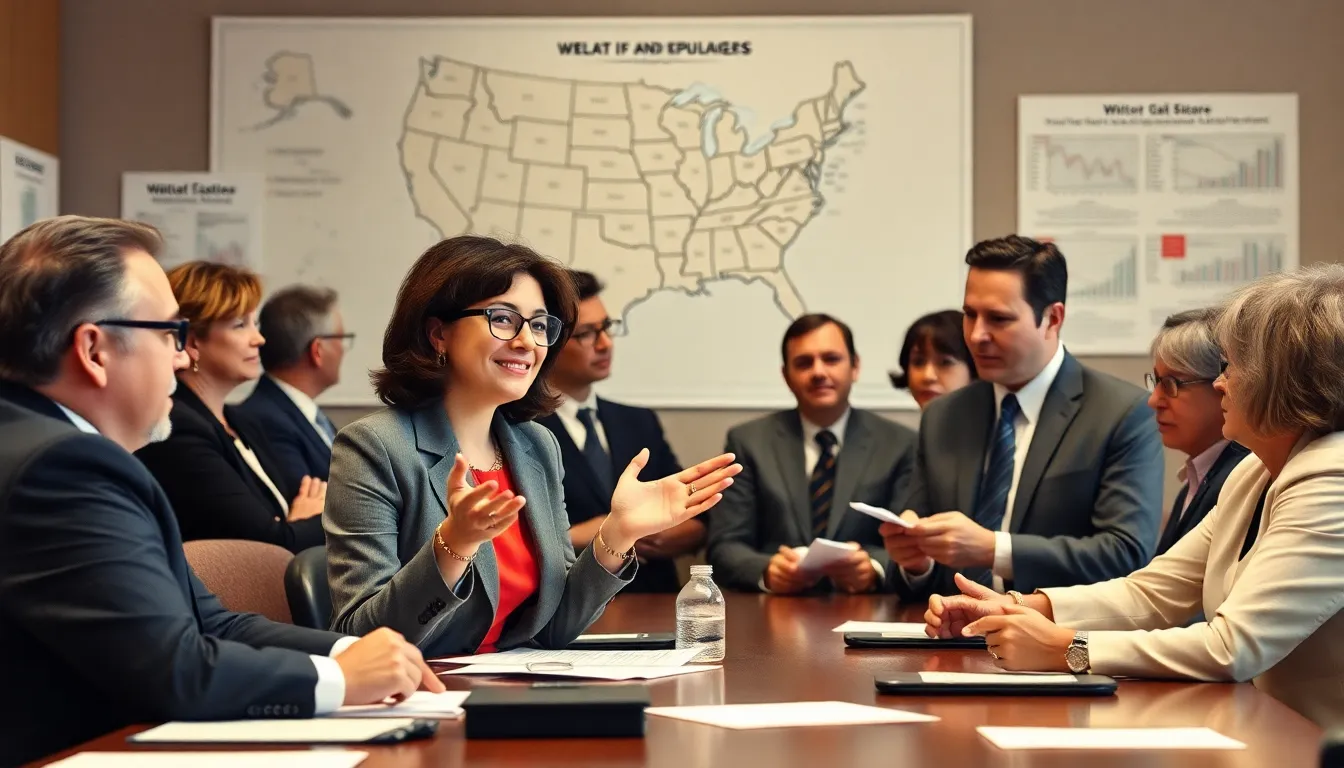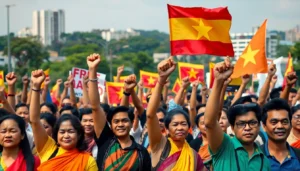Table of Contents
ToggleIn the high-stakes world of politics, negotiation isn’t just a skill; it’s an art form. Picture a chess game where every piece represents a different interest, and the stakes are nothing less than the future of a nation. Political negotiation can feel like a dance—sometimes graceful, sometimes a bit clumsy, but always essential.
Whether it’s wrangling over budget allocations or hammering out international treaties, the ability to negotiate effectively can make or break a political career. It’s where charisma meets strategy, and let’s face it, who doesn’t love a good plot twist? As we dive into the intricacies of political negotiation, prepare to uncover the secrets that turn heated debates into fruitful agreements. After all, in politics, if you’re not negotiating, you might just find yourself sitting on the sidelines with a bowl of popcorn.
Overview of Political Negotiation
Political negotiation involves a complex interplay of interests among various stakeholders. Participants navigate through divergent perspectives to reach mutually beneficial outcomes. Skilled negotiators employ strategies that balance assertiveness with compromise. Budget discussions often illustrate this dynamic, showcasing both power struggles and opportunities for collaboration.
International treaties serve as another critical context for political negotiation. Countries engage in dialogue to foster partnerships, ensuring that agreements address individual national needs. Approaching negotiations with cultural sensitivity enhances understanding and respect among parties. Effective communicators adapt their messages to resonate with diverse audiences, thereby expanding their influence.
Strategic preparation plays a vital role in political negotiation. Researching positions and motivations of all parties provides a foundation for crafting persuasive arguments. Utilizing data-driven approaches aids in justifying stances while identifying potential areas for compromise. Clarity in communication helps avoid misunderstandings and promotes transparency during discussions.
Building rapport among stakeholders fosters a conducive environment for negotiation. Trust emerges as a crucial element, allowing for open dialogue and constructive exchanges. Establishing common ground early in the process increases the likelihood of successful outcomes.
Ultimately, political negotiation hinges on active engagement and skillful maneuvering. Recognizing the nuanced factors at play can lead to effective resolutions in complex political landscapes. By integrating charisma and strategy, negotiators can turn contentious issues into cooperative agreements that benefit all involved.
Key Elements of Political Negotiation

Effective political negotiation hinges on various key elements that shape the outcomes of discussions. Communication strategies and power dynamics serve as foundational components that negotiators must consider to achieve their objectives.
Communication Strategies
Clarity in communication drives the negotiation process. Stakeholders must express their positions and expectations without ambiguity. Active listening enhances understanding and fosters an environment where all parties feel valued. Nonverbal cues also play a significant role; body language can convey trust or skepticism. Utilizing persuasive arguments anchored in data strengthens positions and builds credibility. Tailoring messages to resonate with different audiences ensures that negotiators connect meaningfully, enhancing the likelihood of agreement.
Power Dynamics
Recognizing power dynamics is crucial in political negotiations. Various stakeholders enter discussions with differing levels of influence, shaped by their roles and resources. A negotiator with strong backing from constituents commands greater authority. Collaboration often emerges when parties acknowledge mutual interests, lessening adversarial tension. Understanding the relative power of each participant allows negotiators to craft strategies that accommodate these disparities. Balancing assertiveness with flexibility helps achieve win-win outcomes, ensuring that all involved feel represented and engaged in the resolution process.
Types of Political Negotiation
Political negotiation encompasses various forms that address distinct contexts and challenges. Understanding these types enhances the effectiveness of engagement strategies.
Diplomatic Negotiation
Diplomatic negotiation involves discussions between representatives of nations. These representatives aim to resolve conflicts, establish alliances, or create treaties. Successful diplomats utilize cultural awareness to navigate complex international landscapes. They often engage in multilateral talks, addressing multiple parties simultaneously. Such engagements require patience and strategic communication to build trust. In cases where tensions run high, negotiators often employ back-channel communications to find common ground discreetly. Achieving consensus in these discussions can lead to significant advancements in global relations.
Legislative Negotiation
Legislative negotiation occurs within governmental bodies, focusing on the creation or amendment of laws. Policymakers engage in discussions to reconcile diverse interests and agendas. Each participant typically represents a specific constituency or party, making it essential to balance competing priorities. Coalition building becomes a critical component of this type of negotiation. Throughout the process, stakeholders often employ compromise and persuasion to secure votes. Such negotiations determine the legislative agenda and can ultimately shape public policy. Effective negotiators in this realm understand the legislative process and the importance of strategic alliances.
Challenges in Political Negotiation
Negotiators face various challenges in political contexts. Addressing these challenges enhances the likelihood of successful outcomes.
Cultural Differences
Cultural differences often complicate negotiations. Different communication styles, values, and customs can create misunderstandings. Negotiators who lack cultural awareness risk misinterpreting intentions and messages. Respecting cultural variations promotes trust and effective dialogue. Adapting approaches based on cultural contexts leads to better collaboration. Familiarity with the other party’s culture fosters rapport and encourages productive discussions.
Ethical Dilemmas
Ethical dilemmas frequently emerge during political negotiations. Stakeholders may encounter conflicts between personal beliefs and professional obligations. Ensuring transparency and honesty often clashes with strategic interests. Navigating these moral complexities demands careful consideration of decision-making processes. Some individuals prioritize party loyalty while others focus on ethical standings. Balancing these perspectives proves essential for maintaining integrity throughout negotiations. Ethical behavior not only builds credibility but also strengthens relationships among participants.
Notable Case Studies
Political negotiation has shaped significant events in history. Several notable examples illustrate its impact on decision-making and policy formation.
Historical Examples
The Camp David Accords in 1978 represent a pivotal moment in Middle Eastern diplomacy. President Jimmy Carter facilitated discussions between Egyptian President Anwar Sadat and Israeli Prime Minister Menachem Begin. Their successful negotiations led to a peace agreement, marking a critical shift in U.S. involvement in the region. The accords demonstrated how effective negotiation strategies can resolve entrenched conflicts and create long-lasting partnerships.
The 1993 Oslo Accords also showcased the potential of political negotiation. Israeli and Palestinian leaders engaged in dialogues that aimed to address territorial disputes and mutual recognition. This groundbreaking agreement highlighted the importance of compromise, with both groups acknowledging each other’s rights. Historical case studies like these showcase the transformative power of negotiation in resolving complex issues.
Contemporary Situations
Recent negotiations around climate change exemplify modern political discussions. Global leaders convened during the Paris Agreement in 2015, where they committed to addressing climate challenges collectively. By balancing national interests with global responsibility, nations established clear goals for reducing greenhouse gas emissions. The agreement reflects the necessity of collaboration in tackling pressing global issues today.
Ongoing trade negotiations between the U.S. and China illustrate the complexities of economic diplomacy. Various stakeholders engage in discussions about tariffs, technology transfer, and market access. Through negotiation, both countries seek to address mutual concerns while fostering economic growth. Current events highlight how political negotiation remains vital in adapting to ever-changing global dynamics.
Political negotiation is an intricate dance that requires skill and understanding. By balancing assertiveness with compromise negotiators can craft agreements that address diverse interests. The ability to communicate clearly and build trust among stakeholders is essential for fostering collaboration.
Navigating cultural differences and ethical dilemmas further complicates the landscape but acknowledging these challenges can lead to more effective outcomes. As demonstrated through historical and contemporary examples the art of negotiation shapes policies that impact societies globally. Engaging in this process not only promotes understanding but also paves the way for lasting partnerships that benefit all parties involved.




